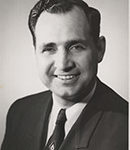Posted: 7/25/03
LifeWay Explore the Bible Series for Aug. 3
James offers relational and ethical guidance
James 1:19-2:4, 8
By Jim Perkins
Madison Hills Baptist Church, San Antonio
Most of us enjoyed the privilege of growing up in a home in which our parents loved us enough to offer practical advice as to how we should live daily. We profited by being able to thrive in a life filled with a variety of relationships and roles.
Live by good principles
James wrote this letter with concern like unto a loving parent. To that end, James constructed this portion of the letter with a view toward guiding them in their relationships and ethical behavior.
 |
Verse 19 contains a theme common to much of the wisdom literature: Be a wise and considerate person as you avoid rash, ill-advised comment and allow others to speak (Proverbs 10:19, 17:27-28, 29:20; Ecclesiastes 7:9). Indeed, James insisted the Christian cannot live the “righteous life” (1:20) God intends unless we renounce our tendency to anger.
This passage contains one other significant challenge for the believer. James insisted in verse 21 that just as his readers would dispose of a soiled and ruined garment, they also should rid themselves of every trace of the “moral filth” and “evil” that was so prevalent and characteristic of the world (that is, people) in open rebellion against the cause of Christ. At the same time, they should find themselves in humble agreement with “the word” (of God, probably the gospel message mentioned in 1:18). Here some would see the phrase “the word planted in you” as an allusion to the fulfillment of the prophecy of Jeremiah 31:33.
Learn from God's word
Humble acceptance of the word of God was needed to bring forth a concrete result in the life of James' readers. His injunction was concise and straightforward: Hear clearly and then obey faithfully.
Why the concept of reception and subsequent action was so vital is explained in James' parable-like discussion of two men in verses 23-25. The first man peered into a mirror and unwisely departed without recognizing the visage was his and that it demanded attention (perhaps to comb his hair or wash his face!). The second man would appear to have done the opposite–he was attentive and acted on the demand. Here, though, James leaped ahead to the intended application: This man heard the word of God–here the “perfect law”–and recognized its claim on him and his need to apply it.
Much of the discussion of this letter has centered on the identity of “the perfect law that brings freedom.” Perhaps this might be described best as the sum total of the moral and ethical teaching contained in Christianity. In addition, the concept of the “perfect law” and the “royal law” (2:8) should be interpreted in the light of Jesus' teaching concerning the “greatest commandment” (Matthew 22:36-40) and Paul's teaching on love for neighbor (Romans 13:8-10).
Look toward others
In 1:26-27, James offered an appropriate illustration of the practical application of a life lived in awareness of the demands made on the Christian by the perfect law that brings new freedom in Christ. The author chose three real-life situations encompassing life with the Father and his children. Two of these topics reiterate subjects mentioned previously.
First, James insisted a “religion” flowing from a true relationship with the Father would necessarily result in a tight rein kept on the unruly tongue. The truth of the need to control the tongue was introduced in 1:19, and will be developed more fully in chapter 3. Here James simply and forcefully asserted that one who will not control his tongue is deceiving himself concerning the efficacy of his professed religiosity.
The second and third life situations included in this section offer positive evidence of a sound religious faith. A vital life of faith will include the care of those who are socially disadvantaged, specifically here widows and orphans. These two categories of people typically were vulnerable to exploitation by society, and at the same time were the object of particular concern on the part of the loving Father (see Exodus 22:22; Isaiah 1:17; Zechariah 7:10; Mark 12:40, 43-44).
The last life situation mentioned here was the need to avoid the ethical and moral pollution which was common in the “world” (people in rebellion against God) and a temptation to God's people living in a society so opposed to the Lord (1:21, 27).
Love all people
Chapter 2 begins with one additional illustration of the Christian life lived in obedience to the royal law that commands us to “Love your neighbor as yourself” (2:8). We cannot be certain whether James was reminded of a specific situation in their meetings that had been related to him or instead chose to include a generalized word of instruction. The net result, however, is that James forbade showing favoritism–whether based on financial considerations or any other factor. God does not exhibit favoritism (Exodus 23:3; Romans 2:11; Ephesians 6:9) and neither should the believer.
Questions for discussion
![]() Make this passage specific to your life: In what area are you most challenged to “be doers and not hearers alone”? What needs to change to make that happen?
Make this passage specific to your life: In what area are you most challenged to “be doers and not hearers alone”? What needs to change to make that happen?













We seek to connect God’s story and God’s people around the world. To learn more about God’s story, click here.
Send comments and feedback to Eric Black, our editor. For comments to be published, please specify “letter to the editor.” Maximum length for publication is 300 words.